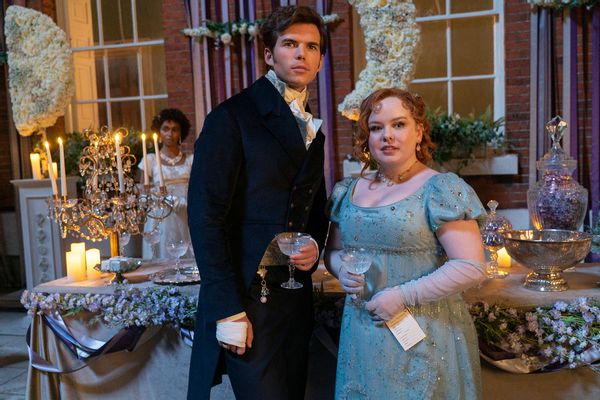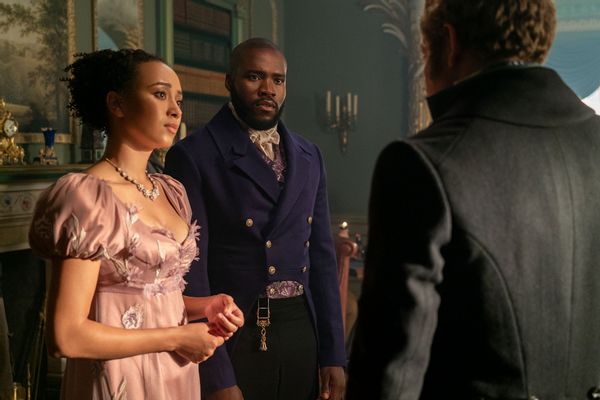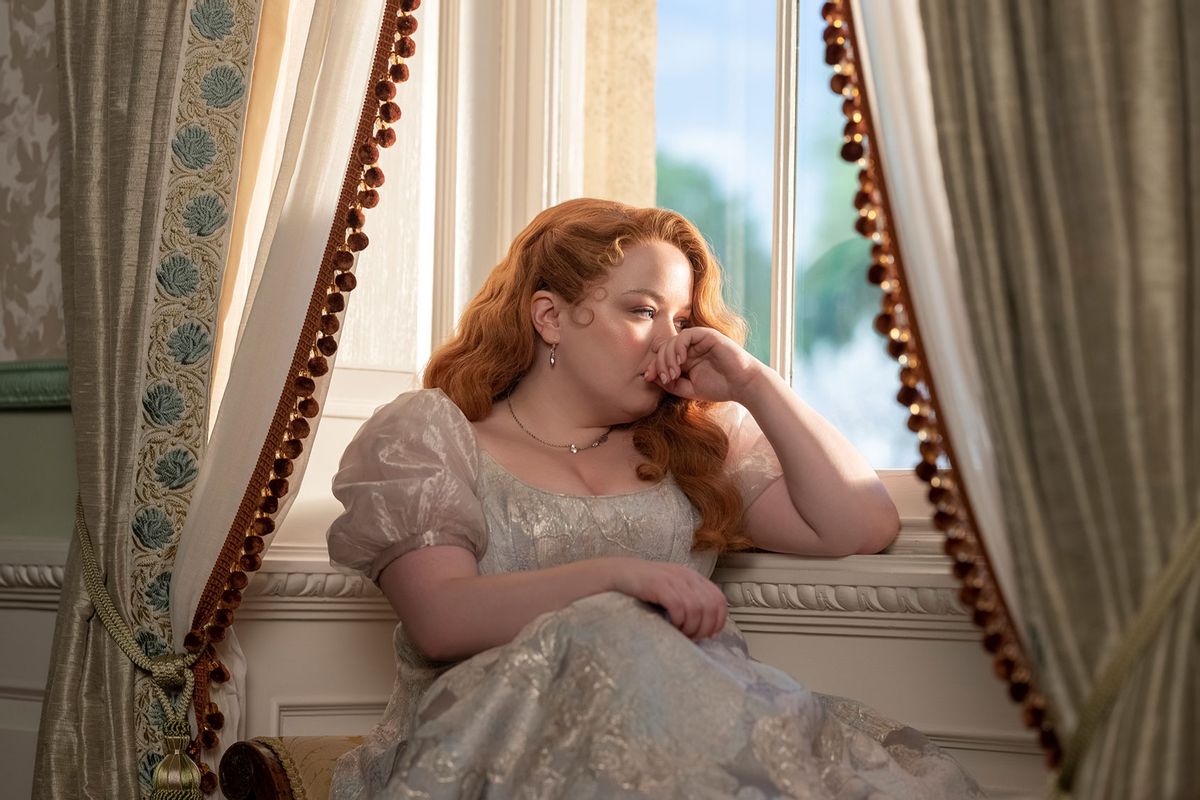Pity the poor Featheringtons, the garish “Bridgerton” family struggling to socially match their graceful, connected and wealthy namesake neighbors across the street. Season 3 finds their matriarch Portia (Polly Walker) secretly fretting over money problems having to do with inheritance law, placing her at the mercy of her ne’er-do-well male cousin.
Specifically, a document specifies that one of her married idiot daughters must produce a male heir with haste lest they lose their generous home and the allowances that come with it, including their social standing.
Mother Featherington turns her focus on those two, never dreaming that her bookish youngest, Penelope (Nicola Coughlan), has untold wealth at her fingertips. This doesn’t refer to the coins hidden under a floorboard in her bedroom, clandestine gains from publishing a gossip periodical under the pseudonym Lady Whistledown (voiced by Julie Andrews), but Penelope’s talent.
Granted, the Featheringtons’ dire straits and the threat of sudden social death barely rate the level of the B- or C-plot in this third go-round with Julia Quinn's sensual Regency-inspired novels. “Bridgerton” is all dessert, happy endings and wish fulfillment. Placing the focus on Coughlan’s shrewdly observant and charming Penelope doesn’t change that.
Penelope is a shrinking violet, but she’s also a romantic tired of being underestimated and cast as unmarriageable. Years of channeling her irritation into her alterego and sparing no one provided her with an outlet and some amount of money.
But depending on your read of this series up to this point that simmering conundrum lends a little fortitude to her turn at the matchmaking wheel.
Penelope lacks the silver tongue and easy charm of other young debutantes. But as Lady Whistledown she can say anything and, if you’ll notice all the coins pressed into delivery boys’ hands in exchange for each new publication, presumably do anything. Including wriggling out from under her mother’s thumb.
The wealthy members of the “ton” hang on her every word, making her the most feared and influential woman in high society besides Queen Charlotte (Golda Rosheuvel) and her matchmaking confidante Lady Danbury (Adjoa Andoh).
“Bridgerton” remains very much what it always was . . . and yet. Taking on Coughlan’s turn as the spotlighted romantic heroine, if not the diamond, of this courtship season, means grappling with the implications of her secret life in more ways than the inconveniences it has caused.
In the first four episodes currently streaming, Lord Debling (Sam Phillips), a naturalist whose vegetarianism is viewed as repulsive, comes onto the scene.
Hand-wringing mothers wouldn’t mind matching their single daughters with him since he also possesses a vast fortune, but when Penelope draws his attention the match seems perfect. She can carry on conversations about books and ideas. He travels for years at a time, which would leave her free to run her business.
 Luke Newton as Colin Bridgerton and Nicola Coughlan as Penelope Featherington in "Bridgerton" (Liam Daniel/Netflix)
Luke Newton as Colin Bridgerton and Nicola Coughlan as Penelope Featherington in "Bridgerton" (Liam Daniel/Netflix)
“Bridgerton” is all dessert, happy endings, and wish fulfillment. Placing the focus on Coughlan’s Penelope doesn’t change that.
Despite being the smartest woman in the ballroom, Penelope also wants love . . . which is where Colin Bridgerton (Luke Newton) fits in. The formerly geeky Colin is freshly returned from a trip around the continent with six-pack abs and a journal full of lusty adventures. Having been friend-zoned, Penelope doesn’t try to include herself in the pool of excited maids throwing themselves at him, enlisting him to play Pygmalion and provide her charm lessons instead.
The first two seasons present success in this world within the framework of securing a marriage. The Bridgerton children have the extra benefit of finding love in their matches. But now we have Penelope. At a time when upper-class women could not aspire to snagging a husband and running a great house, she secretly plays a role in affecting social behavior. Doing so has earned her a clandestine nest egg which, in this world, means freedom. To a point.
We need your help to stay independent
Anyone demanding substance in their TV viewing probably isn’t watching this show. But those who do may be pleasantly impressed by the way the show that ignores the truth of racial stratification in early 1800s Britain is offering a few thoughts about the pride and benefit of work.
 Emma Naomi as Alice Mondrich and Martins Imhangbe as Will Mondrich in "Bridgerton" (Liam Daniel/Netflix)Quinn’s aristocracy is proudly idle, mainly devoted to managing inheritances and, among its women, dressing to impress – the working person’s dream. Season 3 approaches this from a new angle when boxer-turned-business owner Will Mondrich (Martins Imhangbe) and his wife Alice (Emma Naomi) are given a peerage, becoming Lord and Lady Kent.
Emma Naomi as Alice Mondrich and Martins Imhangbe as Will Mondrich in "Bridgerton" (Liam Daniel/Netflix)Quinn’s aristocracy is proudly idle, mainly devoted to managing inheritances and, among its women, dressing to impress – the working person’s dream. Season 3 approaches this from a new angle when boxer-turned-business owner Will Mondrich (Martins Imhangbe) and his wife Alice (Emma Naomi) are given a peerage, becoming Lord and Lady Kent.
As they’re quickly educated on the privileges that come with nobility, they’re also coldly informed that people of their station do not hold jobs. Imhangbe’s bar owner has a problem with that, similar to the reason Penelope can’t bring herself to put away her pen. Still, her industry costs her the bosom friendship of Eloise Bridgerton (Claudia Jessie), who figured out Penelope’s secret identity in the second season and dropped her in favor of Cressida Cowper (Jessica Madsen).
Cressida lacks the currency Eloise and Penelope have in common, which is wit and talent. Penelope simply uses hers to make a profit and savor the stir each new issue creates among the ton’s well-heeled aristocracy.
But power and independence aren’t necessarily the stuff of romance, which is why new showrunner Jess Brownell continues creator Chris Van Dusen’s tradition of spinning romantic complications into inevitable outcomes.
Want a daily wrap-up of all the news and commentary Salon has to offer? Subscribe to our morning newsletter, Crash Course.
At this point in its lifespan the sameness of “Bridgerton” must be a comfort. The gorgeous costumes, the vivid interiors and lush floral arrangements, the towers of sweets and symphonic renditions of pop songs, all melt into the ultimate in unchallenging small-screen escapism.
Oh, did we mention the sex? The latest episodes compensate for the relative chasteness of the second season with artful PG-13 sex scenes wherein the married Bridgertons (as in Jonathan Bailey’s Anthony and Simone Ashley’s Kate) are draped in bed sheets to leave the naughty bits to the imagination. The same is true of middle brother Benedict (Luke Thompson), who gets hot and randy with a merry widow. Instead, the raciest bits are assigned to Colin, who gets to writhe about with topless sex workers in a make-out session implying a threesome.
But within that emotional focus Brownell dances, ever so gently, with conversations about a woman’s power, linking it to her ability to work and be self-sufficient. That Coughlan’s Penelope provides the muse for that rumination is especially satisfying owing to both the actor’s charisma and the character’s spirit.
The fourth episode ends in a cliffhanger that would seem to resolve in the type of soft landing this series excels at, except for the part about Penelope’s secret success. Previews of the season’s back half tease this as the main tension threatening her bliss, which was always in the cards. But knowing what we know about Lady Whistledown and a woman’s ability to find a path wherever she’s placed, regardless of her circumstances, one has to wonder whether love is more expensive than self-sufficiency . . . and the satisfaction of a job well and widely read.
The first half of "Bridgerton" Season 3 is streaming on Netflix. Part 2 debuts on Thursday, June 13.
Read more
about this topic



Shares